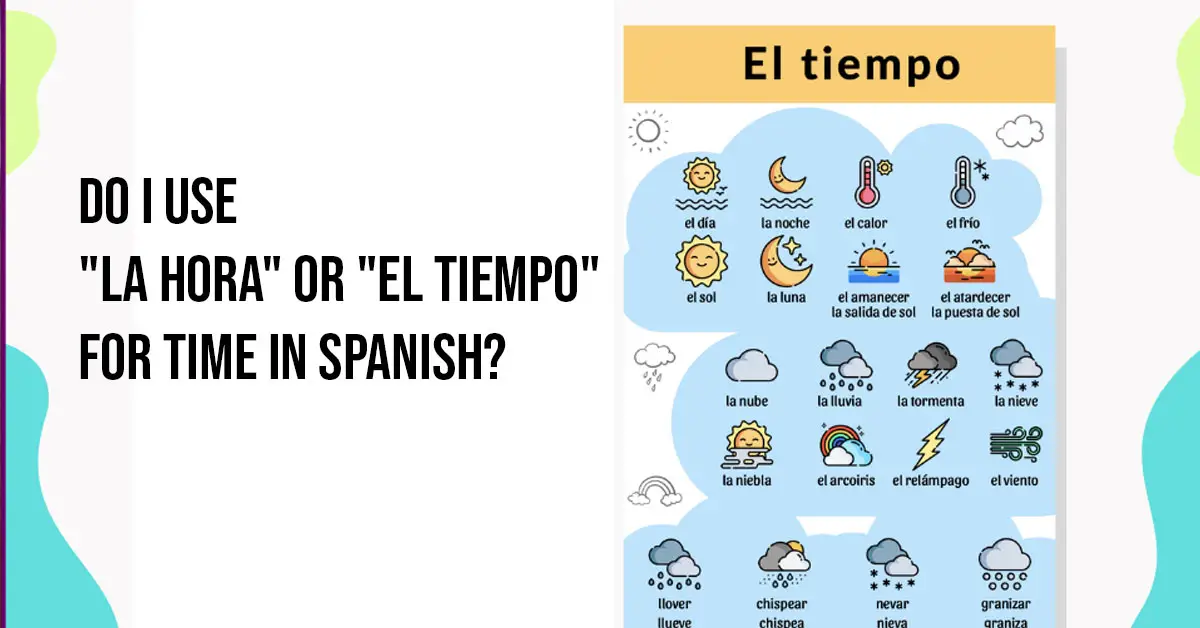Understanding the nuances of language is crucial, especially when it comes to Spanish, a rich and diverse language with various words expressing different concepts of time. Whether to use “La Hora” or “El Tiempo” depends on the context in which you’re referring to time. Let’s delve into the intricacies of these terms to clarify their usage.
Different Words for “Time” in Spanish
In Spanish, there are several words that denote different aspects of time. These include “hora,” “tiempo,” “vez,” “momento,” “medir,” “rato,” “temporada,” “época,” “vida,” and various phrases such as “lo pasamos muy bien,” “completó su trabajo con anticipación,” “siempre,” “érase un vez,” “actualmente,” “ahora,” “entonces,” “antes que nacieras,” and more.
Each of these words carries a specific meaning related to time, whether it’s the specific time of day, duration, occasion, moment, measurement, leisure time, season, era, lifetime, or expressions indicating time-related concepts.
“La Hora” and Its Usage
“La Hora” specifically refers to the time of day. It is used to inquire about or state a specific time. For instance, “¿Qué hora es?” means “What time is it?” In Spanish, “La Hora” is considered a feminine noun and is accompanied by the feminine definite article “la.”
Here are a few examples of sentences using “La Hora”:
- “¿Qué hora es?” (What time is it?)
- “Son las tres de la tarde.” (It’s three o’clock in the afternoon.)
“El Tiempo” and Its Usage
On the other hand, “El Tiempo” encompasses the broader concept of time, including weather conditions. It can refer to meteorological conditions or time in a general sense. For instance, “¿Cómo está el tiempo hoy?” translates to “How is the weather today?”
When discussing weather conditions, “El Tiempo” is the appropriate term to use. However, when referring to the specific time of day, “La Hora” is more suitable.
Distinction between “La Hora” and “El Tiempo”
To avoid confusion, it’s essential to understand the distinction between “La Hora” and “El Tiempo.” While both relate to time, “La Hora” specifically denotes the time of day, whereas “El Tiempo” refers to weather conditions or time in a broader context.
When asking for or indicating a specific time, such as appointments, schedules, or daily routines, use “La Hora.” Conversely, when discussing weather forecasts or time in a general sense, opt for “El Tiempo.”
Conclusion
In summary, knowing whether to use “La Hora” or “El Tiempo” in Spanish depends on the context of the conversation. “La Hora” pertains to the specific time of day, while “El Tiempo” encompasses weather conditions and broader time concepts. By using the appropriate term accordingly, you ensure clarity and precision in communication.
FAQs:
- Are “La Hora” and “El Tiempo” interchangeable? No, they are not interchangeable. “La Hora” specifically refers to the time of day, while “El Tiempo” encompasses weather conditions and broader time concepts.
- How do I ask for the time in Spanish? You can ask, “¿Qué hora es?” which means “What time is it?”
- When should I use “El Tiempo” in Spanish? “El Tiempo” should be used when referring to weather conditions or time in a general sense.
- Is “La Hora” considered a feminine noun in Spanish? Yes, “La Hora” is a feminine noun and is accompanied by the feminine definite article “la.”
- Can “El Tiempo” also refer to the concept of time in a general sense? Yes, “El Tiempo” can refer to the concept of time in a broader context, not just weather conditions.

